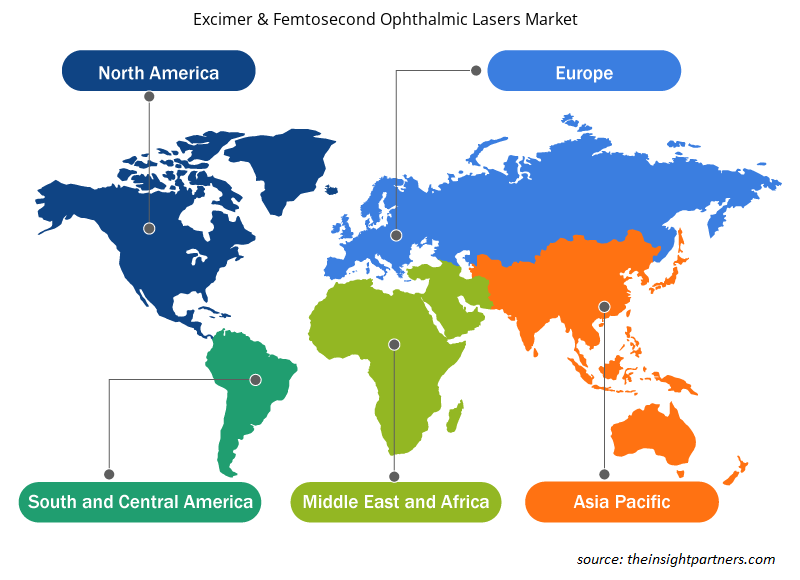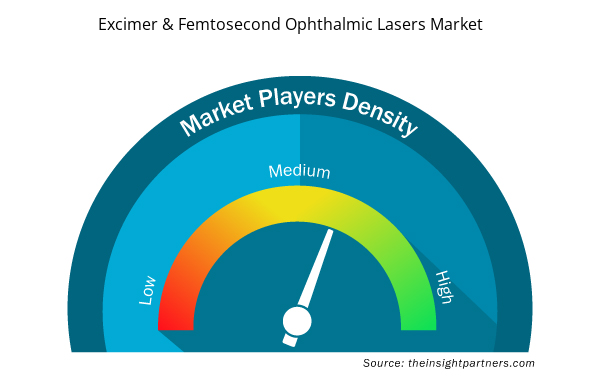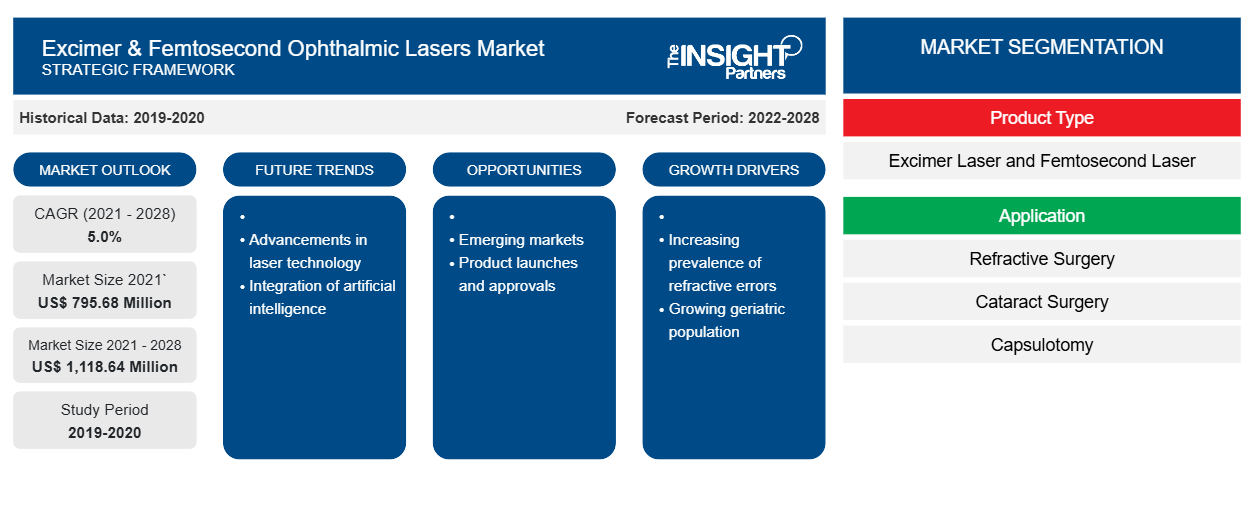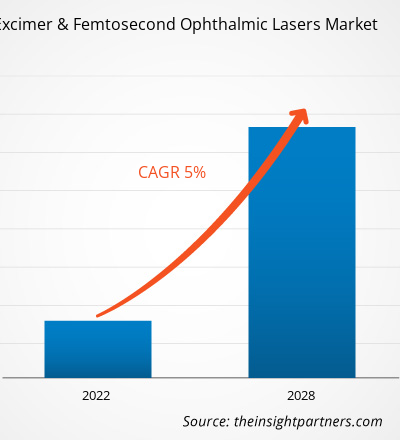Der Markt für ophthalmische Excimer- und Femtosekundenlaser soll von 795,68 Millionen US-Dollar im Jahr 2021 auf 1.118,64 Millionen US-Dollar im Jahr 2028 anwachsen; für den Zeitraum von 2021 bis 2028 wird mit einer durchschnittlichen jährlichen Wachstumsrate von 5,0 % gerechnet.
Die Lasertechnologie wird in vielen medizinischen Disziplinen und Fachgebieten eingesetzt und spielt eine wichtige Rolle bei der Weiterentwicklung der Augenheilkunde, insbesondere der refraktiven Hornhautchirurgie. Es gibt zwei Arten von Lasern in der Augenheilkunde: Excimerlaser, photorefraktive Keratektomie (PRK), Laser-Epithel-Keratomileusis (LASEK), Epipolis-Laser-in-situ-Keratomileusis (Epi-LASIK) und transepitheliale photorefraktive Keratektomie (Trans-PRK) und Presbyopiechirurgie) und Femtosekundenlaser wie Femtosekunden-Laser-in-situ-Keratomileusis (FS-LASIK), Einsetzen von intrakornealen Ringsegmenten, Small-Incision-Lentikelextraktion (SMILE) und Femtosekunden-Lentikelextraktion (Flex).
Berichtsabdeckung
Das Wachstum des Marktes für Excimer- und Femtosekundenlaser wird auf Faktoren wie die zunehmende Zahl älterer Menschen und die Zunahme von Katarakt- und refraktiven Operationen zurückgeführt. Die hohen Kosten für ophthalmologische Operationen und Geräte hemmen jedoch das Wachstum des Marktes.
Passen Sie diesen Bericht Ihren Anforderungen an
Sie erhalten kostenlos individuelle Anpassungen an jedem Bericht, einschließlich Teilen dieses Berichts oder einer Analyse auf Länderebene, eines Excel-Datenpakets sowie tolle Angebote und Rabatte für Start-ups und Universitäten.
- Holen Sie sich die wichtigsten Markttrends aus diesem Bericht.Dieses KOSTENLOSE Beispiel umfasst eine Datenanalyse von Markttrends bis hin zu Schätzungen und Prognosen.
Markteinblicke
Deutlicher Anstieg der älteren Bevölkerung
Der Anstieg der geriatrischen Bevölkerung in Ländern wie den USA, Großbritannien, Kanada, Japan, China, Indien und Südkorea ist auf die Modernisierung der Gesundheitseinrichtungen und Verbesserungen der Gesundheitsdienste zurückzuführen, was die Lebenserwartung in diesen Ländern steigert. Laut Daten der WHO vom Februar 2018 wird der Anteil der geriatrischen Bevölkerung voraussichtlich von 12 % im Jahr 2015 auf 22 % im Jahr 2050 steigen. Laut dem US Census Bureau wird die Zahl der Menschen über 65 in den USA voraussichtlich von 46 Millionen im Jahr 2016 auf über 98 Millionen im Jahr 2060 steigen, während ihr Bevölkerungsanteil in diesem Zeitraum von ca. 15 % auf ca. 24 % steigen wird. Laut dem Bericht „World Population Ageing 2017“ der Vereinten Nationen hatte Europa im Jahr 2017 den weltweit höchsten Anteil (nämlich 25 %) an Menschen über 60 Jahren. Darüber hinaus würden bis 2050 in allen Weltregionen außer Afrika mindestens 25 Prozent der Bevölkerung 60 Jahre oder älter sein, wobei etwa 80 Prozent dieses Wachstums auf die unterentwickelten Länder und die Entwicklungsländer entfallen würden.
Der Verlust des Sehvermögens ist bei älteren Menschen ein großes Gesundheitsproblem. Altersbedingte Makuladegeneration, Glaukom, Katarakt und diabetische Retinopathie gehören zu den häufigsten Ursachen für Sehverlust bei Menschen dieser Altersgruppe. Altersbedingte Makuladegeneration führt zum Verlust des zentralen Sehvermögens. Als Folge eines primären Offenwinkelglaukoms können Sehnervenverletzungen und Gesichtsfeldverlust auftreten. Da diese Krankheit zunächst asymptomatisch sein kann, müssen ältere Menschen regelmäßig untersucht werden. Katarakte sind zwar die häufigste Ursache für Sehprobleme bei diesen Menschen. Katarakte können jedoch normalerweise durch chirurgische Eingriffe entfernt werden. Diabetische Retinopathie tritt auch bei älteren Menschen im Frühstadium von Diabetes oder zum Zeitpunkt der Diagnose häufig auf. Bei der Diagnose Diabetes wird eine mydriatische Untersuchung empfohlen, gefolgt von einem jährlichen Kontrolltermin.
Laut dem American Institute of Ophthalmology unterziehen sich etwa 24,4 Millionen Menschen unter 40 Jahren einer Kataraktoperation, und etwa 5 % aller Amerikaner unterziehen sich bis zum Alter von 75 Jahren einer Kataraktoperation. Darüber hinaus nehmen die Fälle von Glaukom zu, und die Krankheit betrifft über 2,7 Millionen Amerikaner im Alter von 40 Jahren und älter. Neue Augenkrankheiten wie die altersbedingte Makuladegeneration, von der über 2,1 Millionen Amerikaner im Alter von 50 Jahren und älter betroffen sind, können zu schwerwiegenden Sehverlusten führen. Daher werden neue Technologien wie Femtosekundenlaser bei der Kataraktoperation sehr häufig eingesetzt, was zwar eine große Anfangsinvestition erfordert, aber Verbesserungen bei den Patientenergebnissen verspricht. Der Anstieg der geriatrischen Bevölkerung treibt also das Wachstum des Marktes für Excimer- und Femtosekundenlaser an.
Produkttypbasierte Einblicke
Basierend auf dem Produkttyp ist der Markt für Excimer- und Femtosekundenlaser in Excimerlaser und Femtosekundenlaser unterteilt. Das Femtosekundenlasersegment wird voraussichtlich im Jahr 2021 den Markt anführen und seine Dominanz zwischen 2021 und 2028 beibehalten. Darüber hinaus wird erwartet, dass dasselbe Segment in den kommenden Jahren am schnellsten wächst.
Anwendungsbasierte Erkenntnisse
Basierend auf der Anwendung ist der Markt für Excimer- und Femtosekunden-Augenlaser in refraktive Chirurgie, Kataraktchirurgie, Kapsulotomie, Trabekuloplastik und Diagnostik unterteilt. Das Segment der refraktiven Chirurgie wird voraussichtlich im Jahr 2021 den größten Marktanteil halten, während das Segment der Kataraktchirurgie im Prognosezeitraum voraussichtlich die höchste durchschnittliche jährliche Wachstumsrate (CAGR) auf dem Markt verzeichnen wird.
Endbenutzerbasierte Erkenntnisse
Basierend auf dem Endverbraucher ist der Markt für Excimer- und Femtosekundenlaser in Krankenhäuser, Augenkliniken und ambulante chirurgische Zentren unterteilt. Schätzungen zufolge wird das Krankenhaussegment im Jahr 2021 den größten Marktanteil haben. Allerdings wird das Segment der Augenkliniken im Prognosezeitraum voraussichtlich die höchste durchschnittliche jährliche Wachstumsrate (CAGR) auf dem Markt verzeichnen.
Produkteinführungen und Zulassungen sind die von Unternehmen häufig angewandten Strategien, um ihre globale Präsenz und ihr Produktportfolio zu erweitern. Unternehmen auf dem Markt für Excimer- und Femtosekundenlaser konzentrieren sich auf die Kooperationsstrategie, um ihren Kundenstamm zu erweitern, was ihnen wiederum ermöglicht, ihren Markennamen weltweit aufrechtzuerhalten.
Excimer- und Femtosekundenlaser für die Augenheilkunde
Regionale Einblicke in den Markt für Excimer- und Femtosekunden-Ophthalmologielaser
Die regionalen Trends und Faktoren, die den Markt für Excimer- und Femtosekundenlaser im Prognosezeitraum beeinflussen, wurden von den Analysten von Insight Partners ausführlich erläutert. In diesem Abschnitt werden auch die Marktsegmente und die Geografie für Excimer- und Femtosekundenlaser in Nordamerika, Europa, im asiatisch-pazifischen Raum, im Nahen Osten und Afrika sowie in Süd- und Mittelamerika erörtert.

- Erhalten Sie regionale Daten zum Markt für ophthalmische Excimer- und Femtosekundenlaser
Umfang des Marktberichts zu ophthalmischen Excimer- und Femtosekundenlasern
| Berichtsattribut | Details |
|---|---|
| Marktgröße im Jahr 2021` | 795,68 Millionen US-Dollar |
| Marktgröße bis 2028 | 1.118,64 Millionen US-Dollar |
| Globale CAGR (2021 - 2028) | 5,0 % |
| Historische Daten | 2019-2020 |
| Prognosezeitraum | 2022–2028 |
| Abgedeckte Segmente | Nach Produkttyp
|
| Abgedeckte Regionen und Länder | Nordamerika
|
| Marktführer und wichtige Unternehmensprofile |
|
Marktteilnehmerdichte für Excimer- und Femtosekundenlaser: Auswirkungen auf die Geschäftsdynamik
Der Markt für Excimer- und Femtosekundenlaser wächst rasant. Dies wird durch die steigende Nachfrage der Endnutzer aufgrund von Faktoren wie sich entwickelnden Verbraucherpräferenzen, technologischen Fortschritten und einem größeren Bewusstsein für die Vorteile des Produkts vorangetrieben. Mit der steigenden Nachfrage erweitern Unternehmen ihr Angebot, entwickeln Innovationen, um die Bedürfnisse der Verbraucher zu erfüllen, und nutzen neue Trends, was das Marktwachstum weiter ankurbelt.
Die Marktteilnehmerdichte bezieht sich auf die Verteilung der Firmen oder Unternehmen, die in einem bestimmten Markt oder einer bestimmten Branche tätig sind. Sie gibt an, wie viele Wettbewerber (Marktteilnehmer) in einem bestimmten Marktraum im Verhältnis zu seiner Größe oder seinem gesamten Marktwert präsent sind.
Die wichtigsten Unternehmen auf dem Markt für ophthalmische Excimer- und Femtosekundenlaser sind:
- Bausch Health Companies Inc.
- Alcon Inc.
- ZEISS International
- NIDEK CO., LTD
- IVIS-TECHNOLOGIEN
Haftungsausschluss : Die oben aufgeführten Unternehmen sind nicht in einer bestimmten Reihenfolge aufgeführt.

- Überblick über die wichtigsten Akteure auf dem Markt für ophthalmische Excimer- und Femtosekundenlaser
Markt für ophthalmische Excimer- und Femtosekundenlaser – nach Produkttyp
- Femtosekundenlaser
- Excimer-Laser
Markt für ophthalmische Excimer- und Femtosekundenlaser – nach Anwendung
- Refraktive Chirurgie
- Kataraktoperation
- Kapsulotomie
- Trabekuloplastik
- Diagnose
Markt für ophthalmische Excimer- und Femtosekundenlaser – nach Endverbraucher
- Krankenhäuser
- Augenkliniken
- Ambulante Chirurgische Zentren
Markt für ophthalmische Excimer- und Femtosekundenlaser – nach Geografie
- Nordamerika
- UNS
- Kanada
- Mexiko
- Europa
- Asien-Pazifik (APAC)
- Naher Osten und Afrika (MEA)
- Süd- und Mittelamerika (SCAM)
Firmenprofile
- Bausch Health Companies Inc.
- Alcon Inc.
- ZEISS International
- NIDEK CO., LTD
- IVIS-TECHNOLOGIEN
- EXCELSIUS MEDICAL GMBH
- Ziemer Ophthalmic Systems
- SCHWIND EYE-TECH-SOLUTIONS
- LENSAR, Inc.
- NKT Photonics A/S
- Historische Analyse (2 Jahre), Basisjahr, Prognose (7 Jahre) mit CAGR
- PEST- und SWOT-Analyse
- Marktgröße Wert/Volumen – Global, Regional, Land
- Branche und Wettbewerbsumfeld
- Excel-Datensatz



Report Coverage
Revenue forecast, Company Analysis, Industry landscape, Growth factors, and Trends

Segment Covered
This text is related
to segments covered.

Regional Scope
North America, Europe, Asia Pacific, Middle East & Africa, South & Central America

Country Scope
This text is related
to country scope.
Häufig gestellte Fragen
The excimer & femtosecond ophthalmic lasers market majorly consists of the players such as Bausch Health Companies Inc., Alcon Inc., ZEISS International, NIDEK CO., LTD, IVIS TECHNOLOGIES, EXCELSIUS MEDICAL GMBH, Ziemer Ophthalmic Systems, SCHWIND EYE-TECH-SOLUTIONS, LENSAR, Inc., and NKT Photonics A/S among others.
Factors such as the significant rise in elderly population and increase in the number of cataract and refractive surgeries are driving the market growth.
The excimer & femtosecond ophthalmic lasers market is segmented into North America, Europe, Asia Pacific, Middle East & Africa, and South & Central America. In North America, the US holds the largest size of the excimer & femtosecond ophthalmic lasers market. North America held a prominent position in the global market due to growing healthcare expenditure in the US and the development of world-class healthcare infrastructure. Further, the growing prevalence of ophthalmic disorders is anticipated to underpin the demand for these products in the regions. The Asia Pacific region is expected to account for the fastest growth in the excimer & femtosecond ophthalmic lasers market. The market in the Asia Pacific region is expected to grow at a quicker pace due to factors such as rapid growth in the geriatric population, the rise in healthcare awareness about the importance of eye health, and the increase in the number of cataracts refractive surgeries.
The refractive surgery segment dominated the global excimer & femtosecond ophthalmic lasers market and held the largest revenue share in 2021. However, the cataract surgery segment is expected to grow at the fastest rate during the coming years.
Excimer Laser eye surgery is a treatment to correct nearsightedness, farsightedness, or astigmatism. The surgery reduces or eliminates the need to wear contact lenses or glasses. In this surgery, the rays of invisible ultraviolet light from the excimer laser remove a minimal quantity of tissue from the cornea to correct the curvature. This process is known as photo ablative decomposition.
Similarly, a femtosecond laser, an infrared laser, emits bursts of laser energy at a high-speed rate. A femtosecond laser has a pulse span in the femtosecond range or one quadrillionth of a second. Femtosecond Lasers are widely used for cataract surgery. The U.S. Federal Drug Administration (FDA) approved Femtosecond Lasers Assisted Cataract Surgery (FLACS) in 2010. According to the WHO, cataract is the leading cause of blindness globally, and nearly 18 million people are bilaterally blind from cataract.
Hospitals, ambulatory surgical centers, and ophthalmology clinics are key end users of excimer & femtosecond ophthalmic lasers. Hospitals offer various treatments for different eye conditions. An ophthalmologist in these hospitals treats thousands of patients with a wide variety of eye conditions. Thus, the hospitals segment led the market in 2021 and is expected to retain its dominance during the forecast period.
Trends and growth analysis reports related to Life Sciences : READ MORE..
The List of Companies - Excimer & Femtosecond Ophthalmic Lasers Market
- Bausch Health Companies Inc.
- Alcon Inc.
- ZEISS International
- NIDEK CO., LTD
- IVIS TECHNOLOGIES
- EXCELSIUS MEDICAL GMBH
- Ziemer Ophthalmic Systems
- SCHWIND EYE-TECH-SOLUTIONS
- LENSAR, Inc.
- NKT Photonics A/S
The Insight Partners performs research in 4 major stages: Data Collection & Secondary Research, Primary Research, Data Analysis and Data Triangulation & Final Review.
- Data Collection and Secondary Research:
As a market research and consulting firm operating from a decade, we have published and advised several client across the globe. First step for any study will start with an assessment of currently available data and insights from existing reports. Further, historical and current market information is collected from Investor Presentations, Annual Reports, SEC Filings, etc., and other information related to company’s performance and market positioning are gathered from Paid Databases (Factiva, Hoovers, and Reuters) and various other publications available in public domain.
Several associations trade associates, technical forums, institutes, societies and organization are accessed to gain technical as well as market related insights through their publications such as research papers, blogs and press releases related to the studies are referred to get cues about the market. Further, white papers, journals, magazines, and other news articles published in last 3 years are scrutinized and analyzed to understand the current market trends.
- Primary Research:
The primarily interview analysis comprise of data obtained from industry participants interview and answers to survey questions gathered by in-house primary team.
For primary research, interviews are conducted with industry experts/CEOs/Marketing Managers/VPs/Subject Matter Experts from both demand and supply side to get a 360-degree view of the market. The primary team conducts several interviews based on the complexity of the markets to understand the various market trends and dynamics which makes research more credible and precise.
A typical research interview fulfils the following functions:
- Provides first-hand information on the market size, market trends, growth trends, competitive landscape, and outlook
- Validates and strengthens in-house secondary research findings
- Develops the analysis team’s expertise and market understanding
Primary research involves email interactions and telephone interviews for each market, category, segment, and sub-segment across geographies. The participants who typically take part in such a process include, but are not limited to:
- Industry participants: VPs, business development managers, market intelligence managers and national sales managers
- Outside experts: Valuation experts, research analysts and key opinion leaders specializing in the electronics and semiconductor industry.
Below is the breakup of our primary respondents by company, designation, and region:

Once we receive the confirmation from primary research sources or primary respondents, we finalize the base year market estimation and forecast the data as per the macroeconomic and microeconomic factors assessed during data collection.
- Data Analysis:
Once data is validated through both secondary as well as primary respondents, we finalize the market estimations by hypothesis formulation and factor analysis at regional and country level.
- Macro-Economic Factor Analysis:
We analyse macroeconomic indicators such the gross domestic product (GDP), increase in the demand for goods and services across industries, technological advancement, regional economic growth, governmental policies, the influence of COVID-19, PEST analysis, and other aspects. This analysis aids in setting benchmarks for various nations/regions and approximating market splits. Additionally, the general trend of the aforementioned components aid in determining the market's development possibilities.
- Country Level Data:
Various factors that are especially aligned to the country are taken into account to determine the market size for a certain area and country, including the presence of vendors, such as headquarters and offices, the country's GDP, demand patterns, and industry growth. To comprehend the market dynamics for the nation, a number of growth variables, inhibitors, application areas, and current market trends are researched. The aforementioned elements aid in determining the country's overall market's growth potential.
- Company Profile:
The “Table of Contents” is formulated by listing and analyzing more than 25 - 30 companies operating in the market ecosystem across geographies. However, we profile only 10 companies as a standard practice in our syndicate reports. These 10 companies comprise leading, emerging, and regional players. Nonetheless, our analysis is not restricted to the 10 listed companies, we also analyze other companies present in the market to develop a holistic view and understand the prevailing trends. The “Company Profiles” section in the report covers key facts, business description, products & services, financial information, SWOT analysis, and key developments. The financial information presented is extracted from the annual reports and official documents of the publicly listed companies. Upon collecting the information for the sections of respective companies, we verify them via various primary sources and then compile the data in respective company profiles. The company level information helps us in deriving the base number as well as in forecasting the market size.
- Developing Base Number:
Aggregation of sales statistics (2020-2022) and macro-economic factor, and other secondary and primary research insights are utilized to arrive at base number and related market shares for 2022. The data gaps are identified in this step and relevant market data is analyzed, collected from paid primary interviews or databases. On finalizing the base year market size, forecasts are developed on the basis of macro-economic, industry and market growth factors and company level analysis.
- Data Triangulation and Final Review:
The market findings and base year market size calculations are validated from supply as well as demand side. Demand side validations are based on macro-economic factor analysis and benchmarks for respective regions and countries. In case of supply side validations, revenues of major companies are estimated (in case not available) based on industry benchmark, approximate number of employees, product portfolio, and primary interviews revenues are gathered. Further revenue from target product/service segment is assessed to avoid overshooting of market statistics. In case of heavy deviations between supply and demand side values, all thes steps are repeated to achieve synchronization.
We follow an iterative model, wherein we share our research findings with Subject Matter Experts (SME’s) and Key Opinion Leaders (KOLs) until consensus view of the market is not formulated – this model negates any drastic deviation in the opinions of experts. Only validated and universally acceptable research findings are quoted in our reports.
We have important check points that we use to validate our research findings – which we call – data triangulation, where we validate the information, we generate from secondary sources with primary interviews and then we re-validate with our internal data bases and Subject matter experts. This comprehensive model enables us to deliver high quality, reliable data in shortest possible time.


 Holen Sie sich ein kostenloses Muster für diesen Bericht
Holen Sie sich ein kostenloses Muster für diesen Bericht